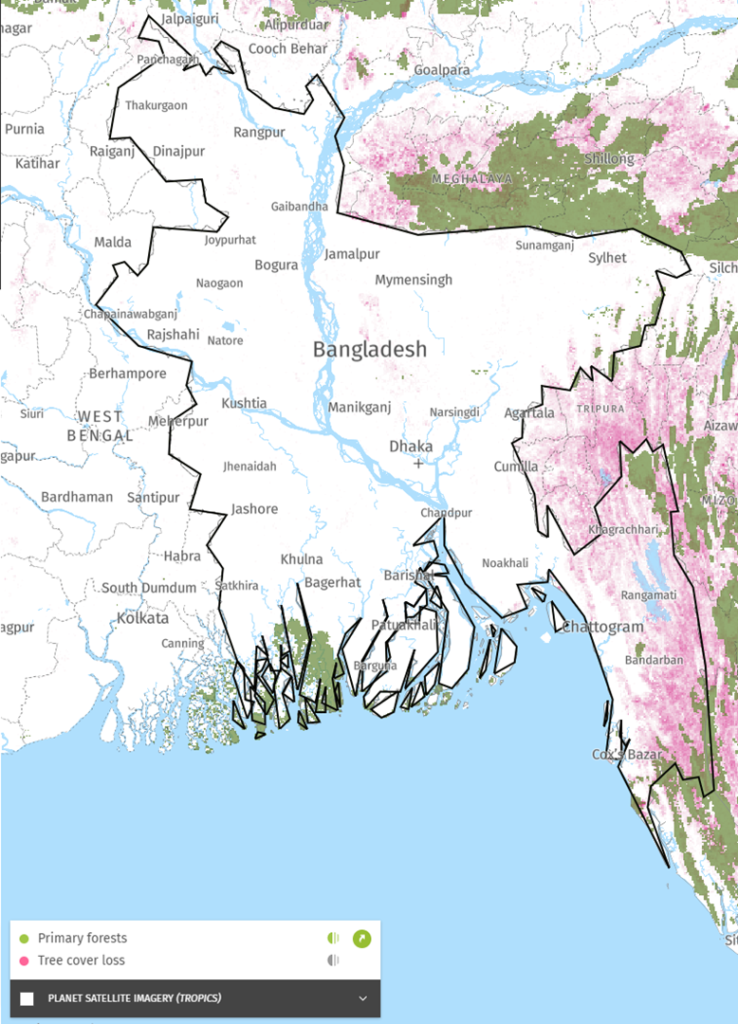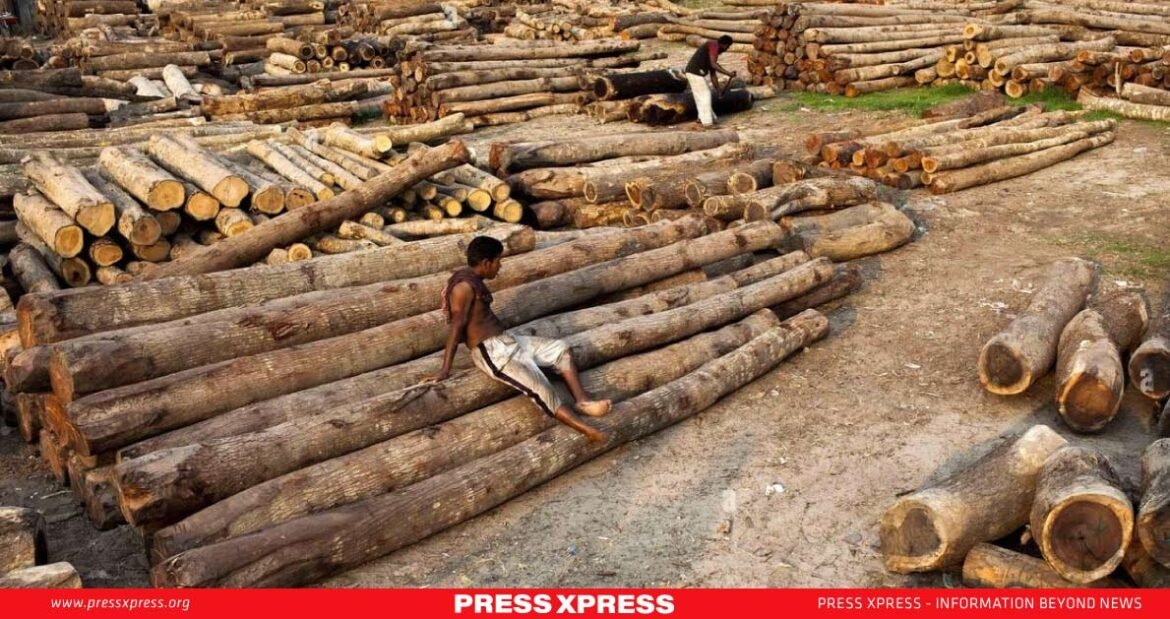World Environment Day 2024 is all about restoring our precious land. With the powerful theme “Our land. Our future. We are #GenerationRestoration,” this year’s event is a rallying cry for action against the devastating effects of deforestation and land degradation.
You can also read: Satellite Ventures to Decode Cloud-Climate Enigma
The harsh reality is that globally we’re losing a staggering ten million hectares of forests every single year. In Bangladesh, the rapid pace of deforestation is putting entire ecosystems and the rich biodiversity they support at risk. To tackle these challenges head-on, Bangladesh needs to get serious about effective land management.
Background

Over the past few decades, the country has been grappling with a devastating reality – severe deforestation that has stripped away much of its natural beauty. In 2010, Bangladesh boasted 2.22 million hectares of natural forest, an impressive 16% of its total land area.
Fast forward to 2023, and the picture is far bleaker: a staggering 17.8 thousand hectares of natural forest have vanished, unleashing a torrent of 10.9 million tons of CO₂ emissions into the atmosphere every year.
The causes of this deforestation are many and complex, ranging from the relentless expansion of agriculture and urbanization to the development of infrastructure projects that carve up the land. And even though Bangladesh has designated certain areas as protected, the grim reality is that illegal logging and encroachment continue to take a heavy toll. The government has taken steps to address the crisis, from signing international pledges to updating national policies, but the challenges of enforcement and implementation remain daunting.
Factors Influencing Deforestation in Bangladesh
The problem of deforestation in Bangladesh is a complex one, with multiple factors contributing to the rapid loss of the country’s precious forests. At the forefront of these drivers is agricultural expansion, as farmers clear vast areas of forest to make way for crops and grazing land for their livestock. Urbanization is also playing a major role, with the relentless growth of cities demanding ever more land for housing and infrastructure development.

Infrastructure projects themselves, such as the construction of roads and railways, are another key factor leading to forest loss. These projects often have little regard for the sanctity of protected areas, slicing through them and further eroding the already depleted forest cover. Illegal logging is also rampant, with trees being felled without proper permits or oversight, accelerating the pace of deforestation at an alarming rate.
Surprisingly, even well-intentioned social forestry initiatives can sometimes backfire, causing unintended harm to the ecosystem. The planting of fast-growing species like eucalyptus may seem like a quick fix, but these trees can actually disrupt the delicate balance of the forest. To truly protect Bangladesh’s forests, it is imperative that we address these multifaceted factors head-on.
Effects of Deforestation on the Environment
The environmental consequences of deforestation are nothing short of devastating, with impacts that ripple far beyond the immediate loss of trees. One of the most alarming effects is the erosion of soil, as the absence of trees leaves the land vulnerable to the ravages of wind and rain. This relentless assault strips away the fertile topsoil, dealing a heavy blow to agricultural productivity.
But the damage doesn’t stop there. Deforestation also wreaks havoc on the delicate balance of the water cycle, as trees play a crucial role in regulating rainfall patterns. When they are removed, local precipitation dwindles and river flows are disrupted, setting the stage for droughts and water scarcity that can have far-reaching impacts on communities and ecosystems alike.
Perhaps most worrying of all is the way deforestation fuels the global climate crisis. Forests are nature’s carbon sinks, absorbing vast quantities of CO₂ from the atmosphere. But when they are cut down, all that stored carbon is released back into the air, contributing to the buildup of greenhouse gases that are driving climate change.
And then there is the catastrophic loss of biodiversity, as the destruction of forests decimates the habitats of countless species of plants and animals. Many of these species are found nowhere else on Earth, and their disappearance pushes them ever closer to the brink of extinction.
Policies to Stop Deforestation
Bangladesh has implemented policies like the Forest Act of 1927 and signing international pledges to end deforestation by 2030 (A goal that seems unattainable, given the current scenario). Social forestry programs involve communities in forest management, while new governance approaches for protected areas aim to conserve biodiversity and provide sustainable benefits to locals.
However, enforcement remains a challenge, and deforestation rates continue to rise at faster rate than the global average. To turn the tide, Bangladesh must strengthen policy implementation and community engagement, working hand in hand with those who depend on the forests to secure a greener future for all. Only through this collaborative approach can the country hope to make real progress in the fight against deforestation.
Factors Behind Policy Implementation Failures
Several factors hinder the implementation of deforestation policies in Bangladesh. The government cannot often enforce regulations effectively due to inadequate resources and manpower.
Corruption is also rampant, with illegal logging and land grabbing often abetted by local authorities, undermining enforcement efforts. Economic pressures play a significant role, as many communities rely on forests for their livelihood, creating a complex web of competing interests.
Poor coordination between government agencies and local communities further compounds the problem, leading to disjointed and ineffective policy implementation. Overcoming these challenges will require bridging the gap between top-down regulation and bottom-up engagement, fostering a spirit of cooperation and shared responsibility in the fight against deforestation. Only by addressing these underlying issues can Bangladesh hope to make meaningful progress in protecting its precious forests for generations to come.
Analysis
Bangladesh finds itself mired in a complex deforestation crisis, with rates remaining stubbornly high despite concerted efforts to turn the tide. The government’s pledge to end deforestation by 2030 rings hollow in the face of lackluster implementation, as the country hemorrhaged a staggering 17.8 thousand hectares of precious natural forest in 2023 alone, unleashing a torrent of CO₂ emissions into the atmosphere.
At the heart of this crisis lie the economic needs of communities who depend on the forests for their very survival, relying on them for fuelwood and farming in a way that often puts them at odds with conservation efforts. Illegal logging and corruption only serve to fan the flames, with local authorities frequently turning a blind eye to the problem or lacking the resources to enforce laws effectively.
While international pledges like the Glasgow Declaration offer a glimmer of hope, translating them into tangible impact on the ground will require a herculean effort to strengthen enforcement and strike a delicate balance between economic development and environmental protection. Only by involving communities as equal partners in this fight can Bangladesh hope to emerge victorious in the battle against deforestation.
Conclusion: The Future of Forests
In Bangladesh, stronger enforcement and robust laws could help protect the remaining forests, but success will depend on actively engaging local communities as partners in conservation efforts.
Economic pressures will challenge forest protection, requiring innovative solutions and a balance with development. International support and funding are crucial. Climate change threats, like rising sea levels and frequent flooding, may push Bangladesh to prioritize aggressive measures such as large-scale reforestation and land restoration. Ultimately, the fate of the country’s forests will depend on its resolve and commitment to working hand in hand with communities on the ground to secure a greener, more sustainable future.


